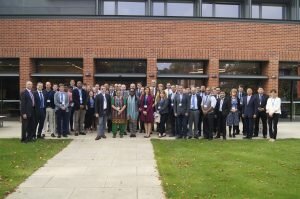27th Sept. 2017 The NIHR GHRGN Launch Meeting - A perspective from the University of Cambridge Medical Students.
From Bogotá to Bangalore: The NIHR Global Health Research Group on Neurotrauma Launch
The NIHR Global Health Research Group on Neurotrauma (GHRGN) launch meeting was held at Robinson College, Cambridge on the 27th of September 2017. It marked the official inception of the Group and brought together representatives of 15 countries, including all 8 partner countries. With delegates from India, Indonesia, Malaysia and Myanmar to South Africa, Tanzania, Ethiopia and Colombia, the hall was a melting pot of neurotrauma expertise. The Group came into fruition as a result of the rising global neurotrauma burden, predominantly in low and middle income countries (LMICs). More than 5 million people die every year as a result of trauma, accounting for 9% of the world’s deaths. Traumatic brain injury (TBI) is responsible for many of these deaths and sadly survivors are often left permanently disabled. Critically, 90% of injury-related deaths occur in LMICs while only a small volume of research happens there. Funded through a £1.78 million grant from the Department of Health, the Cambridge Group and its partners aim to improve the prevention, investigation, treatment and outcome of neurotrauma in LMICs.
To get the ball rolling, Professor Hutchinson extended a warm welcome to all the global partners and set out the Group’s vision. Angelos Kolias then outlined the structure of the Group and explored the four main research themes: mapping TBI care; understanding TBI care; generating and implementing innovation in TBI care; and measuring and nurturing research capacity. Following on, David Clark and Alexis Joannides explained the practicalities of mapping epidemiology and outcomes in neurotrauma via central registries. Tom Bashford shared the benefits of a systems engineering approach to neurotrauma, which is an integrated and interdisciplinary method of designing and managing complex health systems. A fresh perspective. Dhupal Patel then spoke of the necessity of constructing validated and reliable quality indicators to measure patient-centred neurotrauma outcomes. We were delighted to hear Evelyn Brealey from Addenbrooke’s Abroad share insights into how to design collaborative health partnerships with LMICs that foster sustainable co-development. Rowan Burnstein, who volunteered as part of the Myanmar-Cambridge partnership, talked about her experience of intensive care medicine in Myanmar.
During the day, we were joined by Stephanie Russell and Elaina Davis from the UK NIHR Global Health Research Programme who emphasised the government’s priority in funding global health research. We were also fortunate to be joined by Julie Mytton, who leads the NIHR Global Health Research Group at UWE. She shared her group’s preliminary work in studying road injuries in Nepal. We noticed similarities between the Cambridge and UWE groups’ strategies and saw the value in sharing ideas between groups to encourage synergies. Gail Rosseau who has held extensive leadership roles in international neurosurgical associations spoke about the current state of WHO involvement in Global Surgery. She gave a compelling argument for the need to influence policy-makers to include global neurosurgery into National Surgical Plans. Kee Park from the Program in Global Surgery and Social Change at Harvard then gave a bird’s eye view of the global distribution of neurosurgical practice, underlining the unequal distribution of neurosurgeons in the world.
Jill Winegardner reminded us of the importance of neuropsychological rehabilitation in neurotrauma patients’ recovery, a service which is often lacking in LMICs. This message was brought home by James Piercy, a TBI survivor, who shared his personal story of the care he received. He advocated for better public engagement and education regarding TBI. An inspiring reminder, especially for aspiring neurosurgeons like ourselves. Following on, Trish Groves, the director of academic outreach and advocacy for BMJ, highlighted the importance of equipping young researchers with the tools and know-how to identify and answer the right research questions and disseminate the results to the wider scientific community. Professor Menon shared the progress of the CENTER-TBI project, a great example of global collaborative research. Before heading off to a scrumptious lunch, we were herded outside for a group photo.

After lunch, the delegates were encouraged to swap seats and get to know one another in the spirit of collaboration. Franco Servadei, president of the WFNS, kicked off the afternoon by hammering home the disparity of global neurotrauma research in relation to its burden. He expressed hope and enthusiasm about the Group’s mission, stating that “this is the way forward”. We then listened to partners from across the world share their local experiences of neurotrauma care as well as their research findings: Andrés Rubiano from Colombia; Tsega Laeke and Abenezer Tirsit from Ethiopia; Deepak Gupta, B. Indira Devi and Matthew Joseph from India; Tedy Apriawan from Indonesia; Vicknes Waran from Malaysia; Pe Thet Khin from Myanmar; Tony Figaji from South Africa; and Hamisi Shabani from Tanzania. We were enlightened to the spectrum of geographic, socio-economic and cultural challenges that these neurosurgeons face and to the genius of their frugal innovations to overcome these. Memorably, Tony Figaji showed a world map upside down (“the right way round”) to challenge our often preconceived neo-colonial worldview and to highlight the importance of locally-driven research.
After coffee, the delegates were divided into two groups: mapping and understanding TBI care; and innovation in TBI care and building research capacity. A great opportunity for stakeholders, including us as students, to pick each other’s brains (pun intended) to shape the research questions to be explored. It was a productive exercise in understanding the similarities and differences in the capacities and capabilities of all partner institutions.
After concluding remarks, delegates reconvened for a wonderful reception and dinner provided by Robinson College to mark the end of this group launch meeting. Very promising indeed. It was an honour to be invited to the NIHR GHRGN. We left informed, inspired and encouraged to contribute to the success of this project and to global neurotrauma research as a whole.
Bilal Abou El Ela Bourquin
Sujit Gnanakumar